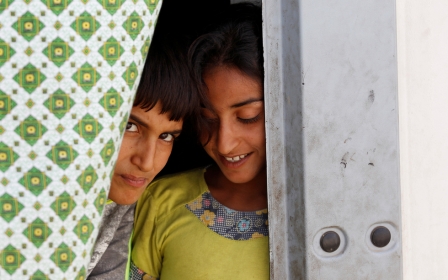Turkey may launch Iraqi ground operation if threatened: Minister

Turkey's foreign minister said on Tuesday Ankara could launch a ground operation in Iraq to remove threats from Kurdish groups to its forces stationed in the country.
"If there is a threat posed to Turkey, we are ready to use all our resources including a ground operation...to eliminate that threat," Mevlut Cavusoglu said in an interview with Kanal 24 broadcaster.
"It is our most natural right," he added.
Cavusoglu referred to Turkey's ambitious offensive in Syria as an example of how Turkey took the threat to its security seriously.
Since 24 August, Ankara has supported opposition rebels to clear the Islamic State group (IS) from its border and halt the westward advance of the Syrian Kurdish militia YPG.
Turkey views the YPG - People's Protection Units - as a terror group linked to the outlawed Kurdistan Workers' Party (PKK), which is waging an insurgency in Turkey's southeast.
The PKK is proscribed as a "terrorist" organisation by the United States and the European Union but the YPG is seen by Washington as the most effective force against IS in Syria.
The PKK has bases in the Qandil mountains in northern Iraq which the Turkish military regularly hits with its warplanes.
Cavusoglu said any threat against Turkey in neighbouring regions of Iraq - including the northern district of Sinjar - could draw a response.
"If the threat to us increases (there), we can deal with them using our rights under international law and our strength including a ground operation," he added.
The minister said on Monday the PKK wanted to make Sinjar a "second Qandil", but such actions would not be allowed and that Turkey would "intervene more actively" to stop it happening.
Ankara also said this week it had already hit IS positions with its artillery at the Bashiqa camp in northern Iraq. But Baghdad has denied Turkey's participation in military operations to retake the northern city of Mosul.
Cavusoglu previously said that as a result of the artillery fire from the camp, 17 "terrorists" had been killed. He added that four F-16 fighter jets were also on standby to take part in any international coalition air strikes in Iraq.
An offensive to push IS out of Mosul, Iraq's second-biggest city, has entered its second week with Iraqi forces and Kurdish Peshmerga fighters continuing their advance on the city.
Meanwhile, Turkey's ramped up rhetoric about further military action continued with Cavusoglu warning that if the YPG militia in Manbij, northern Syria, did not leave the city, "we know how to remove them with our own resources".
Mosul and Raqqa campaigns will 'overlap'
The United States expects the campaigns against Islamic State in Mosul and Raqqa to overlap, U.S. Defense Secretary Ash Carter said on Tuesday, signalling that a push to start isolating the group's de facto capital in Syria may not be very far off.
"Yes, there will be overlap and that's part of our plan and we are prepared for that," Carter told a news conference in Paris after a gathering of 13 countries in the U.S.-led coalition fighting Islamic State.
He did not offer further specifics, but his words suggested that military moves against Islamic State's stronghold in Syria might not be far off.
French President Francois Hollande, addressing the meeting of defence ministers, warned the coalition needed to watch out for flows of Islamic State fighters from one besieged city to another.
"In these columns of people leaving Mosul will be hiding terrorists who will try to go further, to Raqqa in particular," Hollande said, calling for greater intelligence sharing to identify them.
Hollande also warned that the offensive on Mosul could trigger an outflow of foreign fighters - a concern for European nations wary of attacks at home by returning Islamic State militants from Iraq and Syria.
"We must also be very vigilant towards the return of foreign fighters," Hollande said.
The gathering came just weeks before the first anniversary of attacks in Paris on 13 November by Islamic State that killed 130 people. It was followed by other high-profile incidents in the United States and Europe inspired or perpetrated by the group.
Stay informed with MEE's newsletters
Sign up to get the latest alerts, insights and analysis, starting with Turkey Unpacked
Middle East Eye delivers independent and unrivalled coverage and analysis of the Middle East, North Africa and beyond. To learn more about republishing this content and the associated fees, please fill out this form. More about MEE can be found here.




